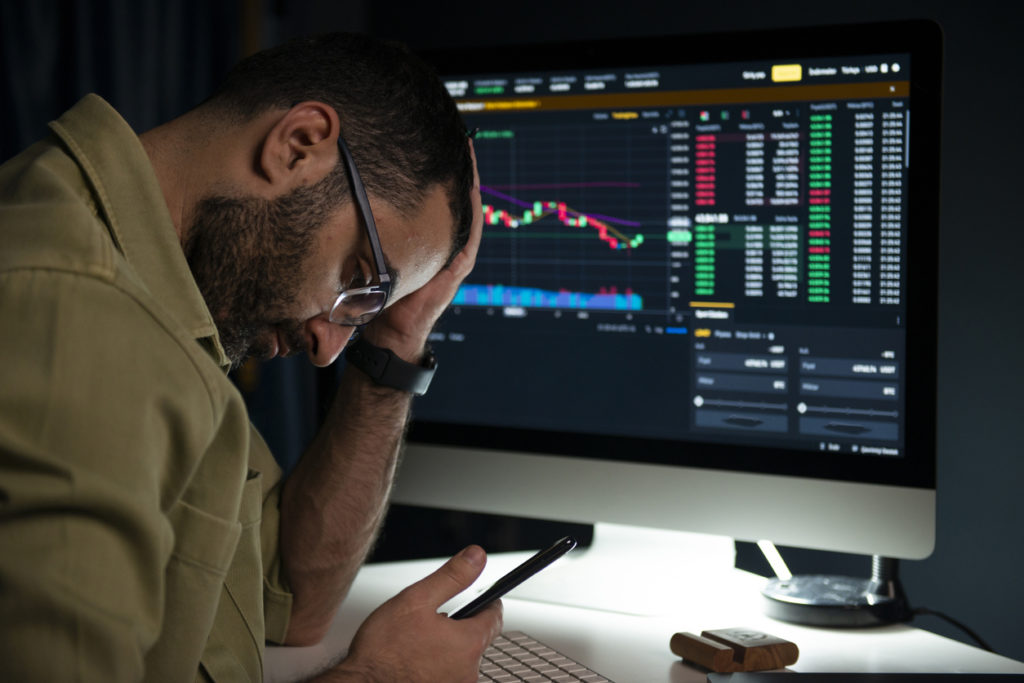Investing in cryptocurrency is becoming more and more prevalent. The cryptocurrency market has skyrocketed. Individual investors are spending big bucks to get into the digital currencies game.
Furthermore, owning some cryptocurrency can increase your financial portfolio’s diversification.
Of course, like any other investment, such as stocks and shares, commodities and fixed income products, there are risks involved in investing in crypto assets. If you are thinking of investing in, buying, or selling one of the thousands of cryptocurrencies such as Bitcoin (BTC), Ethereum (ETH) and others, you should be aware of these risks before taking the plunge.
What are some of the top ten cryptocurrencies to watch? Read our blog here.
Cryptocurrencies are powered by Blockchain technology and are not regulated by a central authority. This means that in the case of fraud, for example, there is no entity like central banks or a government to turn to for help at present.
Because of this, those investors who end up being victims of crypto financial crime may not have the same legal options as conventional victims of fraud. So, the risks involved in dealing with crypto is entirely on the investors. Keeping themselves as protected as possible is entirely on them.
And one way they can do this is by keeping aware and up to date and educating themselves as far as the most common risks and dangers are and how to avoid them. Just like in the traditional forms of investing, crypto investors also need to carry out due diligence before committing themselves to anything in the cryptocurrency world.
Are cryptocurrencies ‘safe’?
The first thing to remember when investing in or buying all cryptocurrencies, is that they are very volatile. This means that their price can fluctuate from day to day and indeed, even hour to hour (and sometimes even minute to minute if Elon Musk tweets about them). Because of this, sudden losses (and sometimes gains) in the value/price of a cryptocurrency are very common.
As an individual investor, there is the scope to make lots of money from cryptocurrencies. However, as stated above, you also need to be aware of the risks involved.
There is no such thing as a guaranteed investment. You should be ultra-suspicious if anyone tells you there is no risk of losing your money. Additionally, as a rule of thumb, you should invest only what you can afford to lose
What are the main risks involved when investing in a cryptocurrency?
There are a plethora of schemes and scams that you should be wary of. From phishing emails to fake celebrity endorsements, it sometimes seems that there is a new scam every day.
Crypto exchanges are committed to increasing their security to avoid hacking. However, danger can never be eliminated completely, and likely never will be.

Apart from this, there is the question of human error. When you trade cryptocurrencies, you are given a private key and public key to be able to receive crypto transactions. You can share your public key without worry. However, if you lose or forget your private key (which is a series of numbers) – or it is stolen – then you stand to lose any crypto you may have in your digital wallet.
Finally, do remember that in most countries, profits made by trading cryptocurrencies are taxable. Check out the laws of the particular country or jurisdiction you are in, or you may find yourself in trouble (and out of pocket) come tax-time. You may also be subject to capital gains tax laws.
Back to scams, here are some common ones that you should be aware of, with a few tips on how to avoid them:
Cryptocurrency pump-and-dump schemes
This kind of exit scam is also known as a ‘rug-pull’ in crypto circles. One way this occurs is when a social media influencer or celebrity encourages their followers to invest in one particular, usually new, cryptocurrency. Of course, the influencer or celebrity receives a financial incentive to do so. Then, when lots of people have purchased the cryptocurrency – and the value soars – the influencers and founders of the crypto sell their coins. They pocket the profit, the value goes down and everyone else loses out. This is called a ‘soft rug pull’.
A ‘hard rug pull’, on the other hand, occurs when developers maliciously abandon a project – withdrawing everything from the liquidity pool – and take the investors’ money. Hard rug pulls are illegal. Soft rug pulls are unethical, but not always illegal.
Red flags include:
- The project coming out of nowhere; reputable crypto projects don’t appear overnight but build investment and interest over time.
- Unclear or no development plans.
- Huge claims which cannot be substantiated.
- Lots of flashy, aggressive marketing.
- Low liquidity.
- Selling restrictions.
- Unknown or anonymous developers.
- Promising a massive amount of growth and/or high yields within a specific time frame.
Phishing
This is when hackers pretend to be someone else to steal your personal details, such as passwords. Do not click on suspicious links and never give your private key away to anyone. Of course, this does not apply solely to crypto; you should always be super vigilant about giving away private information.
Phishing is getting more and more sophisticated. It is often hard to spot when you are being taken for a (very expensive) ride. When in doubt, the best thing to do is to contact the people, companies, or entities they are professing to be before committing yourself to anything.
Fake cryptocurrency exchanges
Bogus and unregulated cryptocurrency exchanges often scam potential victims by pretending to be legitimate and genuine exchanges. Always make sure to use a credible, reputable, and secure cryptocurrency exchange.
Wenlite adheres to the highest standards of regulation and on-boarding processes, making it one of the best, safest and easiest places to buy and sell cryptocurrency.